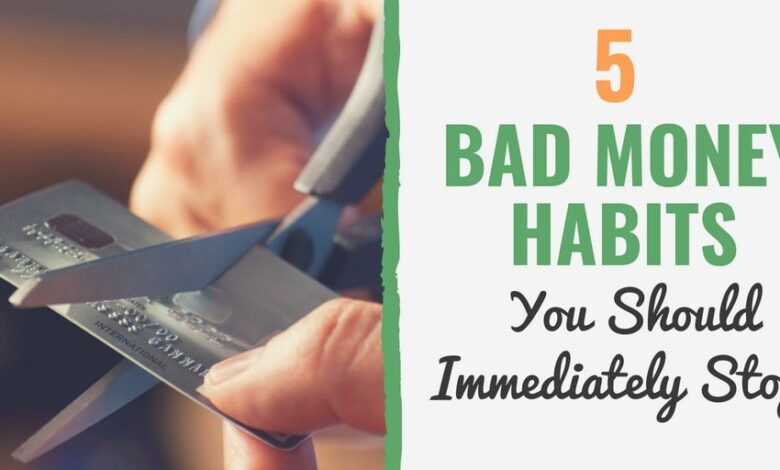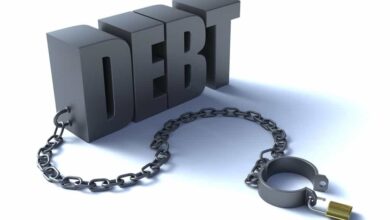
Why You’re Always Broke: 5 Brutal Money Habits That Are Holding You Back
Why You’re Always Broke: 5 Brutal Money Habits That Are Holding You Back
We’ve all been there—living paycheck to paycheck, constantly feeling broke, and wondering where all the money went. You may have the best intentions of saving, paying off debt, or investing, but somehow, you still find yourself in the same financial hole. If you’re tired of being stuck in this cycle, it’s time to take a hard look at the habits that are keeping you from financial success.
In this article, we’ll dive deep into the 5 brutal money habits that are likely holding you back from achieving your financial goals. More importantly, we’ll show you how to break free and start building wealth. Ready to take control of your finances? Let’s get started.
Introduction: Breaking the Cycle of Financial Struggles

Understanding Why You’re Broke
The first step in improving your finances is understanding why you’re broke. For most people, it’s not about earning too little—it’s about how they manage their money. The habits you’ve developed over the years, from spending without a plan to ignoring your debt, are likely keeping you stuck in the same financial cycle.
The Power of Money Habits
Money habits shape your financial life. Whether you’re aware of it or not, every purchase, every bill, and every investment you make is influenced by your financial habits. Habits like impulse buying, ignoring savings, or neglecting to budget can all contribute to your money troubles.
How Small Changes Can Lead to Big Results
Breaking free from these financial struggles doesn’t require a complete overhaul of your life. Small, deliberate changes in your habits can have a huge impact on your financial situation. By making a few shifts in how you think about and handle money, you can start to see real progress.
Habit #1: Living Beyond Your Means – (Brutal Money Habits)
What Does Living Beyond Your Means Look Like?
Living beyond your means refers to spending more money than you earn. If you’re constantly maxing out credit cards, taking out loans, or buying things you don’t need, you’re living beyond your means. This is one of the most common reasons people end up in debt and financial stress.
The Impact of Excessive Spending
Spending more than you earn doesn’t just put you in debt; it also limits your ability to save and invest for the future. As a result, you’ll struggle to build wealth or prepare for emergencies. Over time, this lifestyle can become overwhelming, and you’ll find it hard to break free.
How to Break Free from This Habit
Breaking free from the cycle of overspending starts with awareness. Start by tracking your spending and identifying areas where you can cut back. Set a realistic budget that allows for essential expenses and savings, and commit to living within your means.
Set a Realistic Budget
Use budgeting tools like Mint or YNAB to track your income and expenses. This will help you identify where your money is going and find opportunities for saving.
Track Your Spending
For a month, track every penny you spend, whether it’s on groceries, bills, or entertainment. This awareness will help you spot areas where you can cut back.
Prioritize Needs Over Wants
Ask yourself: Is this purchase essential? Can I live without it? Shifting your mindset to prioritize needs over wants is key to breaking this habit.
Habit #2: Not Saving for the Future – (Brutal Money Habits)
Why Saving Is Crucial
Saving is the foundation of financial security. Without savings, you can’t weather unexpected expenses, let alone plan for retirement or larger life goals. Emergency funds, retirement accounts, and even savings for vacations should all be part of your financial strategy.
The Consequences of Not Saving
If you don’t save, you’re setting yourself up for failure in the event of a financial emergency. Without savings, you’ll rely on debt to cover unexpected expenses, which only exacerbates the problem. Plus, you’ll be unprepared for future goals like buying a house or retiring comfortably.
How to Develop a Saving Habit
The key to saving is making it automatic. Start small and gradually increase the amount you save. Here’s how you can begin building your savings:
Start with Small Goals
Set achievable savings goals, such as saving $50 or $100 each month. As you build momentum, increase the amount.
Automate Your Savings
Use tools like Acorns or Qapital to automatically transfer money from your checking account to your savings account.
Build an Emergency Fund
Aim to save at least three to six months’ worth of living expenses in an emergency fund. This will help you avoid debt when the unexpected happens.
Habit #3: Ignoring Debt and Its Impact – (Brutal Money Habits)
How Debt Can Hold You Back
Debt is a significant obstacle to financial freedom. High-interest debt, like credit card balances or payday loans, can prevent you from saving, investing, or even making ends meet. The longer you ignore your debt, the harder it becomes to pay off.
The Psychological Effects of Debt
Living with debt can cause stress, anxiety, and a feeling of hopelessness. The burden of owing money can weigh heavily on your mental and emotional health, making it even harder to focus on your financial goals.
How to Tackle Debt Head-On
Taking action to pay off debt is crucial for financial freedom. Here’s how you can begin tackling your debt:
Prioritize High-Interest Debt
Start by paying off high-interest debts first. This will reduce the amount of interest you pay over time and free up more money for savings.
Look for Debt Consolidation Options
Consider consolidating your debts into one lower-interest loan to simplify your payments.
Consider Credit Counseling
If you’re struggling with debt, credit counseling services like National Foundation for Credit Counseling can help you create a plan to pay off your debts.
Habit #4: Failing to Budget and Track Spending – (Brutal Money Habits)
Why Budgeting Is Essential
A budget is your roadmap to financial success. Without a budget, it’s easy to spend money impulsively and lose track of your financial goals. Budgeting helps you control your spending, save for the future, and pay off debt more quickly.
The Dangers of Living Without a Budget
When you don’t have a budget, you’re flying blind. You may overspend, miss important bills, or find yourself unable to save. Without a clear financial plan, it’s hard to make progress.
How to Build a Budget That Works for You
Building a budget is simpler than it sounds. Here’s how to create a budget that you can stick to:
Use Budgeting Tools
Tools like Mint and EveryDollar help you track expenses, set savings goals, and monitor your progress.
Stick to the 50/30/20 Rule
The 50/30/20 rule divides your income into three categories: 50% for needs, 30% for wants, and 20% for savings and debt repayment.
Review Your Budget Monthly
Make sure to check your budget every month to see where you can improve and adjust it based on your financial goals.
Habit #5: Not Investing in Your Future – (Brutal Money Habits)
The Importance of Investing
Investing is one of the best ways to build wealth and prepare for the future. Whether it’s stocks, real estate, or retirement accounts, investing allows your money to grow over time, far outpacing inflation.
Why Many People Avoid Investing
Many people avoid investing because they feel they don’t have enough money, or they’re scared of losing it. However, not investing is a surefire way to fall behind financially.
How to Start Investing, Even with a Small Budget
Investing doesn’t require a lot of money to start. Here’s how you can begin:
Open a Retirement Account
Start by contributing to an IRA or 401(k). Many employers match contributions, which is essentially free money.
Start with Low-Risk Investments
Consider starting with low-risk investments like index funds or ETFs, which offer diversification and lower fees.
Educate Yourself on Investment Options
Use resources like Investopedia or Morningstar to learn more about different investment options.
Overcoming These Habits: Practical Steps to Financial Freedom
How to Rewire Your Financial Mindset – (Brutal Money Habits)
Shifting your mindset from scarcity to abundance is essential for financial success. Instead of focusing on what you lack, focus on how you can take action to improve your financial situation.
Implementing New Habits for Long-Term Success – (Brutal Money Habits)
Small, consistent changes can lead to long-term success. Start by implementing one new financial habit each month, whether it’s saving more, budgeting better, or paying down debt.
The Role of Financial Literacy in Breaking the Cycle – (Brutal Money Habits)
The more you understand about money, the better you can manage it. Investing in financial literacy will give you the tools you need to break free from these bad money habits.
Conclusion: Take Control of Your Finances Today – (Brutal Money Habits)
Breaking free from the cycle of financial struggles is possible, but it requires changing your habits. Start by understanding the bad habits that are keeping you broke, and then take small steps toward improving your financial situation. With discipline, awareness, and a focus on long-term goals, you can achieve financial freedom.
Also Read: Escape the Paycheck-to-Paycheck Trap: Discover the Millionaire Habits That Will Change Your Life!
Take Action Now
Don’t wait any longer to take control of your finances. Start by implementing the tips in this article and make the necessary changes to build a brighter, wealthier future.
Frequently Asked Questions (FAQs)
How Can I Stop Living Paycheck to Paycheck?
Start by budgeting, cutting unnecessary expenses, and saving a portion of each paycheck. Focus on reducing debt and building an emergency fund.
What Are the Best Ways to Build Credit?
Pay your bills on time, keep your credit utilization low, and consider using a secured credit card or becoming an authorized user on someone else’s account.
How Can I Start Investing with No Experience?
Start by learning the basics of investing, then consider low-risk investments like index funds or mutual funds. You can also open a retirement account like an IRA.
How Much Should I Save Each Month?
Aiming to save at least 20% of your income is a good goal. However, start with a percentage you’re comfortable with and gradually increase it over time.
Can Financial Habits Be Changed Over Time?
Yes, with discipline and persistence, you can change your financial habits. Small, consistent efforts will lead to long-term financial success.
CTA: Ready to Take Control of Your Finances?
Start today by implementing these changes and building better money habits. Learn more about financial freedom here.









